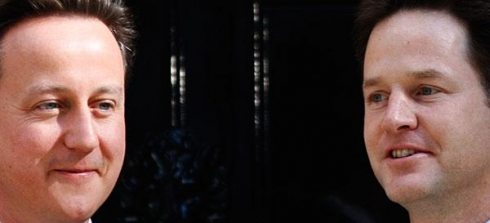The UK has just seen an incredible and unprecedented election campaign, culminating in a coalition government between two parties who, if we are honest, couldn’t have more diverse views and policies. The fighting that went on during the campaign was of the highest calibre, and focused on key issues. There was a lot of respect for both leaders because of the way they argued their corners. But they still fought their corners till the not-so-bitter end.
My first thought when I heard they had reached an agreement was ‘How will they ever reconcile their differences over some huge issues?’ I couldn’t see it working. However, I will give Mr Cameron and Mr Clegg the benefit of the doubt. Recognising that they are two intelligent and highly articulate leaders who are both equally passionate about the future of the United Kingdom, I am quickly coming to the conclusion that, for all the vehement arguments during the campaign, they both see the benefit in discussion, adaptability and even compromise.
What can entrepreneurs learn from the recent events, and the way Cameron and Clegg are behaving? The most obvious area to consider is how we should put our ideas across when we are passionate about influencing others and creating change, but others have valid opinions as well. Having written and spoken for many years on the subject of being vocal and opinionated, I have also seen many leaders – in politics as well as business – take this too far. When a thought leader has great ideas and shares them widely, they acquire a following, but they also attract naysayers and opponents with differing views. That is one of the realities of sharing your ideas: exposure to criticism.
Feeling strongly about something and not saying or doing anything about it can cause a great deal of frustration and anxiety, and even depression. If you have potentially game-changing ideas to share, there is usually a way to do it so that everyone wins. Every day, I find myself encouraging clients to think about the best ways to get important beliefs across in a way that engages and brings people along with you. It is an opportunity to build rapport and support for initiatives and thoughts. It is leadership by influence or what I call REAL thought leadership, and it can be achieved subtly or less subtly.
However, there are times when we need to take a step back and ask ourselves how important it is to keep pressing an issue that is near and dear to our hearts, but one that attracts strong opposition. I believe we then need to weigh our passion and desire to influence people on that subject, against the value of being part of a bigger picture, a higher purpose. In the case of the new UK coalition leaders, they seem to have chosen the higher purpose, which can only be good for the country. As I said, I will give Cameron and Clegg the benefit of the doubt because of the mature way in which they are communicating and considering the big ideas. And I am glad the fighting seems to have been put to one side, as I, like many others, think the bigger picture and the higher purpose needs to be the main focus in this very challenging time in our society.


